EPISODE 304: THERE ARE GIANTS IN THE SKY
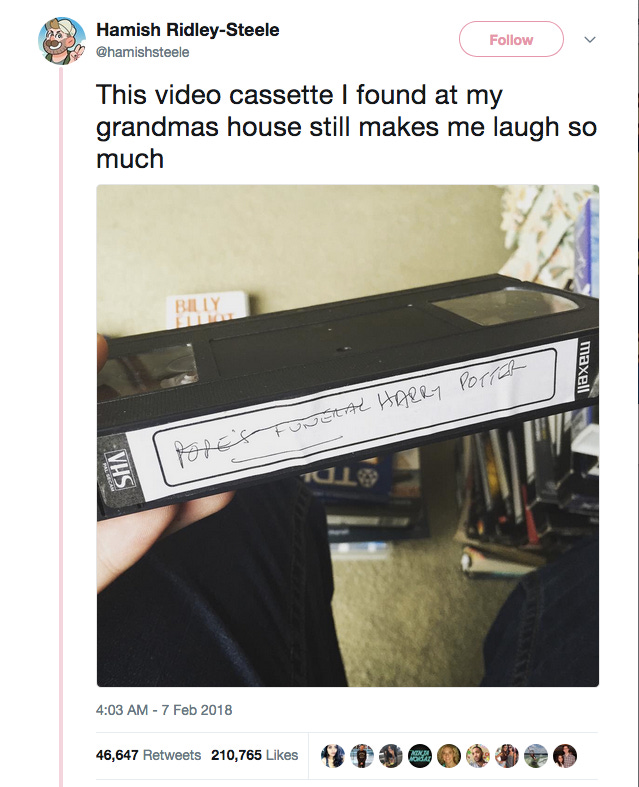
POP CULTURE SPIRIT WOW
The first video game I ever played was Pong. And I don’t mean that in an ironic, hipster kitsch way. I was alive back in the 1970s when parents went to Sears Roebuck and came home with these ugly portable heater-looking devices with knob controllers that seemed way less sticks of joy than dimmers of lights.

Somewhere Steve Jobs is screaming.
You spent the next hour trying to figure out how to hook it up to your television.
* smiles as he imagines his nephews and nieces considering a world without HDMI*
*frowns as he realizes he really wishes his nephews and nieces would explain to him HDMI*
You’re turning the station dial, trying to figure out which of the five channels the game is on. Then the picture keeps rolling up so you’ve got to adjust the vertical and also the horizontal.
There’s no Start screen or anything like that, just a black screen with a white block on either side which you and your opponent control by rolling the gauge on top of the light-dimmer joysticks. A tinier block bounces between them, back and forth past a white line down the middle.
(If you know from Pong, you might want to correct me and say the players controlled longish rectangles, not squares, as in this version. But in the earliest console version of the game, actually they were these unwieldy ugly squares.

The arcade game, which came first (sort of...more on that in a second) had the more traditional paddle lines, which I don’t know why but somehow made more sense.)
I remember a bunch of us clustered around the game, watching it. It’s a very Leave it to Beaver moment, which makes me wonder if it’s even real. But there was definitely a sense in watching the game of being transported to a strange and exciting new world.
I know, it was just table tennis on a screen. Believe it or not, I had no idea. It had such an alien sounding name. “Pong”. It’s the sound of echoes across the barren landscape of the moon. It’s the word that the ancient race of some distant world use to describe the absolute emptiness of space. It’s the hollowness you feel with as you look up towards a landscape of stars you know you’ll never reach.
That, and not an abbreviation for “ping pong”.
(In all honesty, only yesterday when I Googled “pong” did I learn it was as simple as that.
My childhood version of things was way better than reality.) ++ As it turns out, behind the scenes the development of the game Pong was anything but foreign and mysterious – though it was definitely in its own way sad.
Pong started—
Actually, can we just take a moment to acknowledge, whether it is table tennis or what the existential loneliness of the universe sounds like, that Pong is a very satisfying word to say?
Try it with me.
Pong.
Pong.
Pong.
Pong.
Yeah. That’s the good stuff.
So, as I mentioned, Pong was the first home video game. It was designed by Magnavox in the late 60s. (Here’s the original creators showing the game and looking exactly like video game creators today. #BringBackSweaterVests)
But while it was still being tested, one of the people who got to see a demo – a comp sci guy named Nolan Bushnell -- decided to rip it off and produce it as an stand-alone restaurant-type arcade game of his own. He and his partner Ted Dabney had done the same with a different game already, Space War; but with Pong they had huge success.
And that’s how Atari Computers – the Big Bang event of the video game industry -- began.
Here’s the really crazy thing--if you go on to look at the history of Atari, the revolutionary 2600 and all its cool games that I used to play at my friend Alex Tucker’s house--
Aside: I eventually saved enough money from work to buy my own unit, a Colecovision; it had much better graphics than Atari and a couple games I loved, but it could never match that first feeling of swinging over crocodiles or running from dragons in search of keys through white and black and red castles...
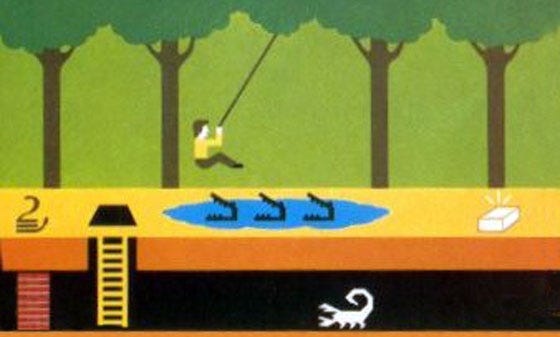
*sigh*
-- the pattern is not success after success but constant litigation. Pretty much from the start Atari had a habit of suing employees who left it (like the guys who started Activision to make games for Atari) and other companies, out of a constant fear that everyone was about to do to them what they did to Magnavox.
Calling King Macbeth. Ghost of King Duncan here to see you. Says your sin is its own curse.
The idea that home video game industry is founded on this ur-act of dishonesty seems kind of biblical, too.
++
So I’ve been wanting to write about video games for a while. I actually had a whole class on them in grad school, and it was way more illuminating even just about Angry Birds or Pac-Man than I ever could have imagined.
Today, it’s such an important industry. Right now Hollywood is going crazy with anticipation about Black Panther, which is anticipated to make $180 million just this week, maybe as much $200. (Marvel’s top opening is $207 million, for “The Avengers”. Love to see it a) be a better story; and b) top that.)
But as exciting as that is, consider this: in its opening weekend in November the video game Call of Duty: World War II made $500 million.
According to Forbes in 2017 people spent $14.6 billion on video games, consoles and accessories, a jump of 11% over the year before and larger than the gross domestic product in about a third of the world’s countries. Meanwhile the U.S. film box office last year was estimated to hit $11.1 billion.
If you don’t play video games, and I think those of us of a certain age probably don’t play too many – although when you include mobile games, I bet the number who haven’t spent some time in the last five years playing something goes way down -- stats like these are so foreign as to suggest there really are alternate universes. Who has the time? And what could possibly be so interesting?
Strictly in order to be able to report back to you, not at all because I am a broken person who has been hearing about one game so much for years that he was desperate for an excuse to invest some time in it, I dipped a toe into one of the bigger games of recent years, a dungeons-and-dragons-type called Skyrim.
The premise: You find yourself in a land riven with conflict. The Imperials, backed by nasty elves, run the continent of Skyrim, while some of the cities (there are about eight in all) are chafing under its bit. Meanwhile, dragons – long since disappeared from the land – have reappeared and are starting to burn everything down. And on both fronts you have a destiny you didn’t realize.
I’m going to describe the game as “live action”. What I mean by that is, the graphics are meant to make everything seem as realistic as a live movie. You walk or ride through gorgeous landscapes filled with mountain, prairies and sea. When the moon’s up, it’s just crazy beautiful.
Actually it's often just crazy beautiful. Here's a couple screenshots:

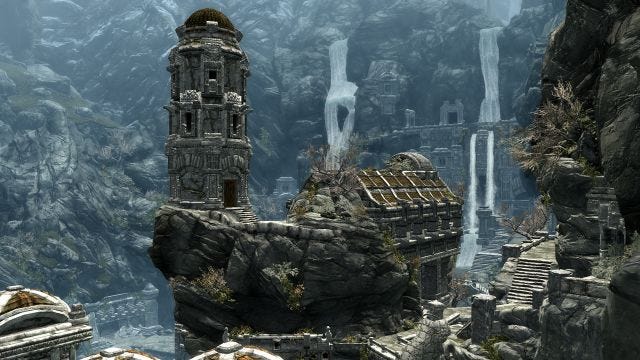


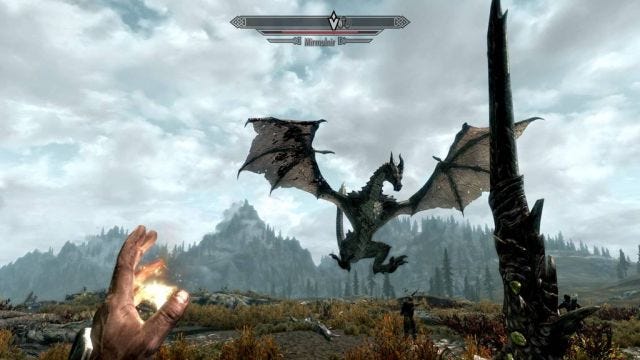
It really does look this cool.
There are cities of people you talk to, most with their own stories, fears and desires – some of which you can help with, some of which they just keep repeating.
(Which, come to think of it, is itself pretty life-like.)
The lords of each city send you on quests which start to open into the bigger stories of the game. But there are also a million side adventures, tombs you come upon where the dead walk and shoot arrows, or abandoned castles where novice magicians do some really messed up experiments, and at this point, I would not be surprised if that number was indeed actually 1,000,000 because people I have given time to this, TIME, (for you of course, it’s all for you) and I am still not done with everything.
One of the things that’s interesting to me about Skyrim is that the world you’re interacting with is a very old world; so alongside the bustling cities and towns there are all these ruins, even a couple ancient abandoned cities, all remnants of past iterations of civilization.

So you’re constantly being reminded that the present is someone else’s graveyard, and at the same time like the issues of today are deeply rooted in a history. It poses an interesting challenge (or corrective?) to the way we tend to think about the world around us.
But here’s what really surprised me: While this game is one part puzzles and three parts now we dance and by dance I mean kill bad guys, the long arc of Skyrim is actually empathy. With few exceptions, each character or group you meet ends up having a backstory you eventually discover that turns them from Friend ™ or Enemy ™ to person.
For example, in the western part of the continent of Skyrim there’s a group called the “Forsworn”.

A Forsworn leader
These guys are just THE WORST – hiding in the hills and attacking travelers, very tough fighters (two axes and a spin move that is devastating) and usually clustered with some of the other weirdest and more dangerous normal characters of this world – Orcs (think Lord of the Rings but taller) and Hagravens (think the witch who eats Hansel and Gretel (oh, you know she totally ate them) with magic shooty fire and ice spells).
The Forsworn are initially presented as this real problem for the people in the Eastern areas, and getting rid of them seems like a help.
But then you learn that in fact the Forsaken are the native people of the continent, that generations ago they were pushed off their land and now pitching their tent in ruins and attacking everyone else is all they have.
So basically every time you wipe out a bunch of them, you’re participating in this broader awful injustice.
It’s interesting, too – Skyrim is filled with groups you can join -- mercenaries, thieves, magicians. You get tasks to complete, you grow in their ranks, it’s fun, you’d like it.
*suddenly realizes the game he is playing is a lot like Jesuit formation, but with cooler power ups. Wonders what this means...*
Some of the groups are really awful, too, like the Dark Brotherhood, who basically murder people for pay. (And not “bad people”. Kids, mothers, innocents. You got the coin, they take the job.) Other groups who would seem straight up enemies for sure, like the Orcs, with time and the right choices unexpectedly welcome you as a friend.
The only significant group in the game that you cannot join is the Forsworn. To me, that hits the point even harder. I get it, you want to make up for having just murdered the rightful owners of the land, but nope, that’s not how this game works. Live with your choices.
There’s smaller versions of this “humanizing” or “empathiz-ing”, too. Towns are constantly hiring you to kill giants. And they are bad news – very hard to kill, ultra-strong and unusually fast moving. (Also, they herd mammoths who will also attack you if you hurt their owners. BAD DOG!)
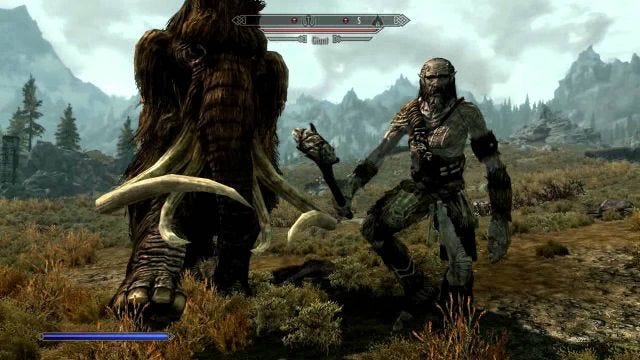
The Skyrim equivalent of a truck coming straight at you.
Yeah, there's no doubt, giants' dangerousness and scariness makes them seem important to eliminate.
BUT, if you take the time to stop and watch you discover the giants never leave their little camps. They don’t rampage or plunder or anything like that. They are basically Bantha herders; they’re only trouble if you venture in and mess with them.
So the whole “help us with this giant” request is not a bad guy being bad guy problem but a NIMBY issue. We just don’t want them here. For the children.
There are endless versions in the story. If I were going to ruin this incredibly rich tapestry by reducing it into a moral or theme, it would be “There is a great difference between being dangerous and being bad.”
Or if you want it less priests-and-their-sin-ny, “There is history here.”
++

Not a character in Skyrim. (Or is he...)
I first met Shane Liesensang, S.J. about four years ago. He was about to enter the Jesuits and had heard there was some guy working as a screenwriter while being a Jesuit (using the term “working” very loosely, please be gentle with me) and wanted to see how that works, as he was coming out of the videogame business himself.
As it turns out, rather than me offering any worthwhile insights about the Jesuits our conversation was more him counseling me about being a writer in Hollywood, most specifically that what looks like a failure (They did not pick up your show! The game you got hired to produce for years and everyone was talking about did not get made!) is actually all part of the journey to the good stuff.
For Shane that meant going from years working on a game that never got produced to being on Skyrim as a story developer pretty much from ground zero. He actually created one of my favorite groups in the game, the Companions, who are these good-guy mercenaries that everyone likes (and are secretly also werewolves).
(And yes, I totally went full were. Don’t judge me. Dangerous is not necessarily bad.)
(I suddenly realize this would be either be a great Twitter bio or unsettle people way too much.)
Shane and I had a great DM-versation over the last few weeks. I’ve cut it into pieces (shredded it, as it were)
(and yeah, I just made a were/were pun, I accept tips and/or karma)
(Now I’m imagining a werewolf who feeds on your karma)
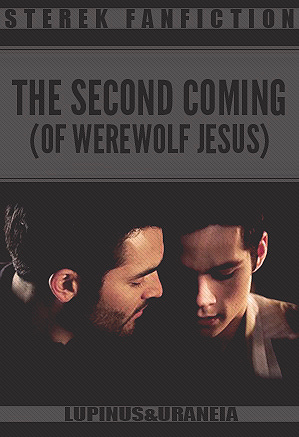
(This is proving to be a really fun issue to write, you guys)
Anyway, I’ve split the interview into sections – the flank, the loin, the ribs – (just had to Google “parts of a cow”) – which I’ll be putting in the next few issues.
Without further achew, ladies and gentlemen, Shane Liesensang.
Shane, thanks for doing this. First question, and most important for my sanity: Does Skyrim ever end?
It depends on how you define “end.” :) There is a finite amount of story quests in the game, but procedural content can give you activities and goals infinitely (if repetitively).
You just want to own the rest of my life don't you.
:D
My problem is (Hi, and welcome to Shane Gives Jim Therapy) I do not like to leave anything unfinished. I am almost incapable of it. So even when I’m as far in as I am and there's still no end to the quests it is super hard to step back and let go.
Does that change when it becomes clear that the quests are repeating? “Sure I have something for you to do… go clear out the [monsters] in [place].”
It absolutely doesn't. At this point I've just decided to try and go to every place I stumble upon that I haven't been to before. But I'm still doing quests for others, too.
Quests are basically the iPhone notifications of Skyrim. Very hard not to click on.
Okay so at this point the readers who have not played Skyrim are like waving and yelling, OVER HERE.
The more I play the game, the more I feel like it’s reallyabout building empathy.
I like that characterization. I don’t know if I’d say that was a conscious goal of the studio as a whole, but it’s certainly one of mine when I make anything.
I think giving everyone a backstory that makes them complicated, makes them interesting is just doing the work of seeing the world, and seeing themselves, from their perspective. Like you say, the Forsworn have a legitimate grievance with the occupying force of their world. The Thalmor are @$$#!%!, for sure --
Editor’s Note: The Thalmor are the frowny elves lurking in the background that are behind the political problems in the game. We hate them.
-- but they are a very specific type of @$$!%!% that comes out of a political reality that they can exploit. (The Thalmor’s backstory is a bit fleshed out in another part of the game, which also contains the character who is MOST my baby. :) )
I think creating the world as a real-feeling place was a definite goal, and of course that means thinking through everyone’s point of view and reasons for acting as they do. The giants are peaceful, but the humans are afraid of them, so they get vilified.
(Did you come across the giant mourning his dead mammoth in the volcanic tundra? Breaks your heart.)
Readers, tell me those two sentences don’t make you want to see it for yourself.
You’re welcome.
There's not really a non-violent answer to the quests in most situations (though I guess I could cast a calm spell over many if I wanted...). But still, it seems like you guys designed the game to make you see the blood on your hands.
With the kind of agency we provide the player in most video games, you’re right in that most problems are solved with some form of violence. It is possible to be a peaceful person in the world — one of my friends just collects mushrooms and flower and makes potions to sell to people and THAT IS THE GAME FOR HER. More importantly, that’s a totally fine way to play the game! I think one of the secrets to Skyrim’s success is how easily people can find the game they want to find within it.
I sometimes feel conflicted about the violence in games. You can see some of my thoughts on this stuff back when I still pretended I would maintain a blog.
Here’s the flipside: I helped the Stormcloaks defeat the Imperials, but their leader Ulfric is awful. I'm pretty sure I'm still playing the game at this point strictly to see whether the kingdom is going to elect him king, and whether I can stop that from happening.
Ulfric is indeed a supremely unlikable figure — if you read some the journals in the Imperial HQ about his imprisonment, you get a glimpse of what happened to him and what brought him to where he is… it doesn’t redeem him, but it does explain.
(Note to Reader: One of the other parts of Skyrim that is really unexpected is that everywhere you go there are books to read. Some teach you spells, but others are just history texts or fairy tales.
You’ll come upon a band of bandits, and at their bedside each person’s got a book they were reading.
Just realizing as I write this, just that one detail, “Here’s a book that guy you killed was reading”, does so much to humanize them and monsterize you.
SHE’LL NEVER FIND OUT WHAT HAPPENS TO REY NOW. NICE GOING, YOU NIGHTMARE PERSON.)

*quietly judging you*
I like that complication myself — there aren’t any simple and easy choices. So many games give “moral choices” that just amount to “Do you want to be Hitler or Mother Teresa?” which is maybe the most boring choice possible, regardless of which you choose.
I choose Luke Skywalker. No, Buffy! No, Samwise Gamgee!
Having to make tradeoffs, weigh options, and take an action when there IS no perfect choice… now that’s what Sid Meier would call an Interesting Decision™. (His definition of a game is famously “a series of interesting decisions.”)
(Can you tell I’m taking ethics this semester? :D)
I can and I love it.
More with Shane next week. In the meantime if you Twitter, he can be found at the fantastically-monickered @optimistpanda.
++ LINKS++

Did you see the Obamas’ official portraits? Did you wonder why it looks like Barack is in his backyard (above) and Michelle is 27 feet tall? This piece will help you.
This is a wonderful thread of people telling stories from their childhood. Two of my favorite:
At a tender age, I saw parts of that damn Nostradamus "documentary" where he said the world will end in 1999. Among other fun things, I had an apocalyptic nightmare scored to Milli Vanilli's "The Dream is Over".
When I was 8 my friends and I went door to door selling homemade keychains so we could buy Bibles for our bullies. My reasoning at the time was that if they read the Bible they would stop bullying me. I have since come to realize that in the hands of a bully the Bible can be as effective a weapon as any, but hey, my heart was in the right place.
And if reading about video games made you at all nostalgic, please enjoy these classic games. (We spent whole evenings in college playing this one.)
Next week, more with Shane, the spirituality of games for your phones, and how thinking about the Catholic sacraments like a video game helps you understand why we're so into some (including some that aren't actually sacraments) and so not into others.
Until then, if you need a laugh, consider this: in Australia last week the Prime Minister was forced to respond to a scandal involving his deputy by declaring publicly that no cabinet member was allowed to have an affair with one of their staff members. Immediately Australian Twitter lit up with the hashtag #bonkban.
Things are messy, but there's still room for joy.
Here we go.

